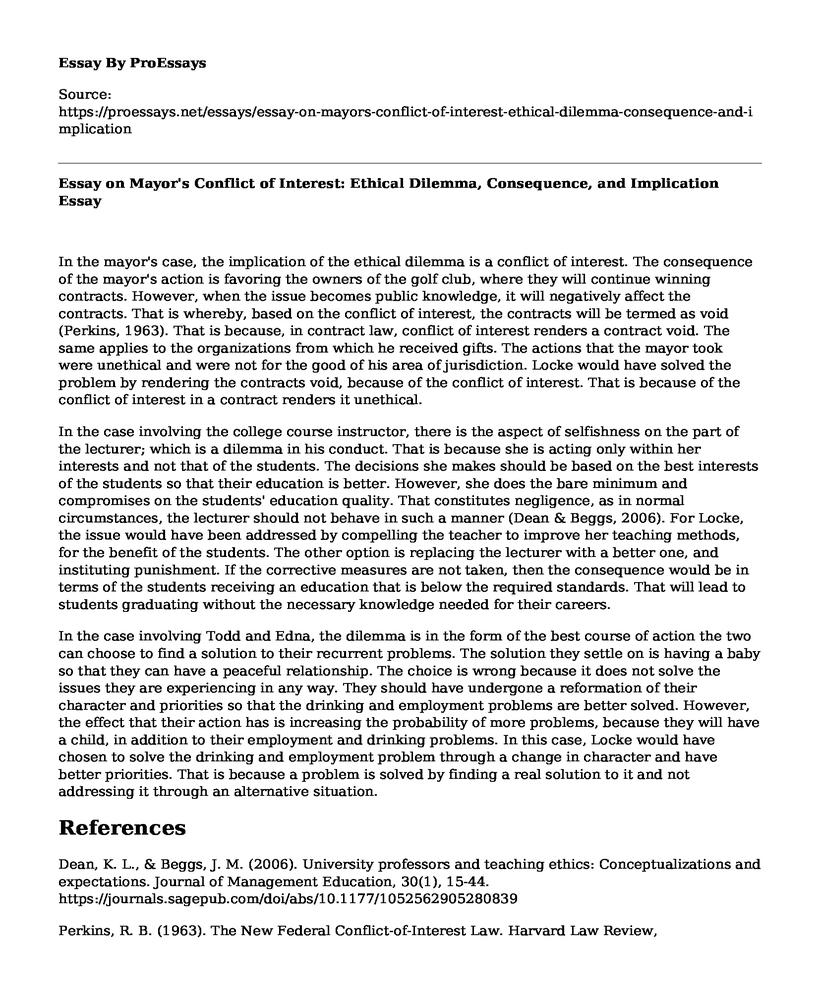In the mayor's case, the implication of the ethical dilemma is a conflict of interest. The consequence of the mayor's action is favoring the owners of the golf club, where they will continue winning contracts. However, when the issue becomes public knowledge, it will negatively affect the contracts. That is whereby, based on the conflict of interest, the contracts will be termed as void (Perkins, 1963). That is because, in contract law, conflict of interest renders a contract void. The same applies to the organizations from which he received gifts. The actions that the mayor took were unethical and were not for the good of his area of jurisdiction. Locke would have solved the problem by rendering the contracts void, because of the conflict of interest. That is because of the conflict of interest in a contract renders it unethical.
In the case involving the college course instructor, there is the aspect of selfishness on the part of the lecturer; which is a dilemma in his conduct. That is because she is acting only within her interests and not that of the students. The decisions she makes should be based on the best interests of the students so that their education is better. However, she does the bare minimum and compromises on the students' education quality. That constitutes negligence, as in normal circumstances, the lecturer should not behave in such a manner (Dean & Beggs, 2006). For Locke, the issue would have been addressed by compelling the teacher to improve her teaching methods, for the benefit of the students. The other option is replacing the lecturer with a better one, and instituting punishment. If the corrective measures are not taken, then the consequence would be in terms of the students receiving an education that is below the required standards. That will lead to students graduating without the necessary knowledge needed for their careers.
In the case involving Todd and Edna, the dilemma is in the form of the best course of action the two can choose to find a solution to their recurrent problems. The solution they settle on is having a baby so that they can have a peaceful relationship. The choice is wrong because it does not solve the issues they are experiencing in any way. They should have undergone a reformation of their character and priorities so that the drinking and employment problems are better solved. However, the effect that their action has is increasing the probability of more problems, because they will have a child, in addition to their employment and drinking problems. In this case, Locke would have chosen to solve the drinking and employment problem through a change in character and have better priorities. That is because a problem is solved by finding a real solution to it and not addressing it through an alternative situation.
References
Dean, K. L., & Beggs, J. M. (2006). University professors and teaching ethics: Conceptualizations and expectations. Journal of Management Education, 30(1), 15-44. https://journals.sagepub.com/doi/abs/10.1177/1052562905280839
Perkins, R. B. (1963). The New Federal Conflict-of-Interest Law. Harvard Law Review, 1113-1169.https://www.jstor.org/stable/1338495?seq=1
Cite this page
Essay on Mayor's Conflict of Interest: Ethical Dilemma, Consequence, and Implication. (2023, Apr 24). Retrieved from https://proessays.net/essays/essay-on-mayors-conflict-of-interest-ethical-dilemma-consequence-and-implication
If you are the original author of this essay and no longer wish to have it published on the ProEssays website, please click below to request its removal:
- Research Proposal Example: Impact of Medical Procedure Prices on Society
- Rumors and Gossip Essay
- Ethical Considerations of Human Cloning Essay Example
- Essay Sample on Teenagers' Perspectives on Appreciating Their Teenage Hood
- Paper Example on the Amish Culture: Impact of Cultural Values on Medical Care
- Essay Example on Loss of Chinese Culture in US: Impacts of Cultural Imperialism
- Free Essay - Cultural Artifacts and Traditions: Exploring the Rich Heritage of Islamic Objects and Practices







